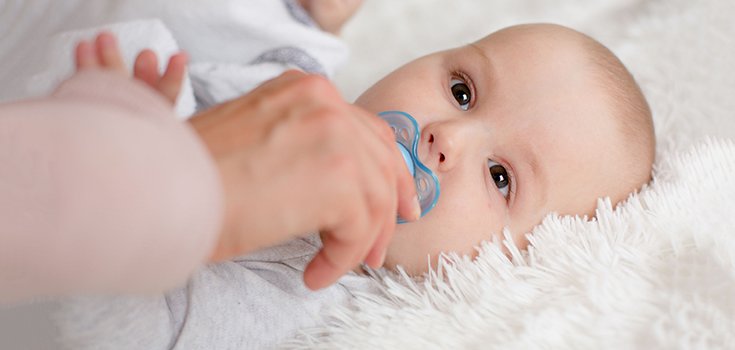Sucking on Your Infant’s Pacifier Could Protect Them from Allergies

Parents who suck on their infant’s pacifier to “clean” it may be helping to protect their little one from allergies, a study suggests.
This …interesting revelation was made after 128 moms in the U.S. were surveyed. Among the moms of infants who used pacifiers, 30 cleaned the pacifier by sterilization, 53 hand-washed the pacifier, and 9 cleaned the pacifier by sucking on it.
Lead author Dr. Eliane Abou-Jaoude, from the Henry Ford Health System in Detroit, said that children whose mothers sucked on a pacifier “had lower IgE levels.”
IgE refers to Immunoglobulin E, a type of antibody related to allergic responses in the body. If you have higher levels of IgE, it typically means you have a higher risk of having allergies, asthma, and eczema. Researchers checked the infants’ IgE levels at birth, and again at 6 months and 18 months of age. [1] [2]
Some of the infants were more genetically predisposed to allergies and asthma than others, as 18% of the mothers in the study had asthma, and about 8% had eczema. [2]
The team found that starting at around 10 months of age, babies whose mothers sucked on their pacifiers had lower IgE levels, and that benefit continued through 18 months. [1]
Study co-author Dr. Edward Zoratti, also from the Henry Ford Health System, said:
“Further research is needed, but we believe the effect may be due to the transfer of health-promoting microbes from the parent’s mouth. It is unclear whether the lower IgE production seen among these children continues into later years.”
Abou-Jaoude added:
“We know that exposure to certain microorganisms early in life stimulates development of the immune system and may protect against allergic diseases later.
Parental pacifier sucking may be an example of a way parents may transfer healthy microorganisms to their young children. Our study indicates an association between parents who suck on their child’s pacifier and children with lower IgE levels, but does not necessarily mean that pacifier sucking causes lower IgE.”
The findings were presented at the American College of Allergy, Asthma, and Immunology (ACAAI) annual meeting in Seattle.
Supporting Previous, Similar Findings
The results are similar to those found in previous research involving 184 infants, where 65 infants whose parents cleaned their pacifiers with their mouths were 88% less likely to have asthma, 63% less likely to have eczema, and 63% less likely to have sensitization (i.e., reaction to allergens) by 18 months of age than the other children in the study. [3]
Further, in 2013, a Swedish study found that babies whose parents sucked on their pacifiers to clean them were 3 times less likely to develop eczema by the time they were toddlers.
Additionally, breastfeeding transmits beneficial bacteria to infants. On top of that, Infants who are breastfed for at least 6 months have fewer antibiotic-resistant bacteria in their guts, likely because the sugars in breast milk feed “good bacteria,” which prevents the proliferation of harmful microbes
A Downside to Sucking on Those Pacifiers
However, there is also a negative side to pacifier-sucking. Just as moms can transmit good bacteria to their infant, they can also transmit potentially harmful ones.
Whasun “Sun” Oh Chung, a research professor at the University of Washington School of Dentistry, said:
“We don’t have enough data to see whether the benefits (of this practice) outweigh the harms.”
Abou-Jaoude agreed, adding:
“We are not telling parents to clean their child’s pacifier by sucking on the pacifier. Bad bacteria can be transferred by a parent sucking on the pacifier and then giving it to their child, exposing them to other infections.”
Plus, if your baby’s pacifier falls on the floor and you put it in your mouth to clean it off, you’re licking off whatever nastiness was on the floor. Better hope you didn’t track any dog poop into the house.
Still, the findings point out how important it is that kids be exposed to a variety of different bacteria. Being “clean” doesn’t necessarily equate to being healthy.
Dr. Wendy Sue Swanson, a pediatrician at Seattle Children’s Hospital, said:
“A diversity of bacteria in your body, in your mouth and on your skin is likely good, particularly in a baby whose immune system is developing. Let them play in the dirt. Introduce foods to them early in life, and allow them to explore the world in some ways like we used to.”
Sources:
[1] HealthDay
[2] Today
[3] Forbes
